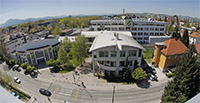Name of the Project: iCamp – Innovative, Inclusive, Interactive & Intercultural Learning Campus
Duration: 1/10/2005 – 31/12/2008
Website: www.icamp.eu
iCamp was an IST project from the 6th Framework Programme of EU. The main goal of the project was to provide an infrastructure – the iCamp Space – for collaboration and social networking across systems, countries and disciplines. The iCamp Space built on existing interfaces and integrate shared community features. Interoperability amongst different open source learning systems and tools was the key to successful sustainability of iCamp.
Research and development activities in the project were grouped under:
- iCamp Models – here we developed the pedagogical and organisational models for cross-cultural collaboration, the pedagogical models for social instruction, role models and types of instruction, the pedagogical model for scaffolding (model of self-organised learning) as well as incentives models with learning contract.
- iCamp Building Blocks – in this WP we selected the most appropriate systems available, adapted the tools and platforms, defined the collaboration environment, defined the technical methods for experience sharing, created a self-organised environment including personal portfolio management and identify and contributed to relevant standards.
- iCamp Integration – this WP was responsible for the integration of the tools and platforms (collaboration and content). It connected educational repositories, develop integration patterns and performed technical testing.
- Validation Trials – the last WP was responsible for performing trials with students and educators to validate the iCamp pedagogical model and the appropriate support provided by the technical infrastructure.
Project Results:
The main iCamp results can be summarised as:
- The iCamp educational intervention model
- The iCamp portfolio of tools and technologies
- iCamp handbook How to use social software in higher education
- Evaluation guidelines
Partners:
- Universität für Bodenkultur – Centre for Social Innovation, AUS
- Institut “Jožef Stefan”, SLO
- University of Leicester, UK
- Universidad Politechnica de Madrid, ESP
- Wirtschaftsuniversität Wien, AUS
- AGH University of Science and Technology, POL
- Kaunas University of Technology, LT
- Isik University, TR
- Tallinn University, EE
- Tomas Bata University, CZ
- Siemens, GER.


